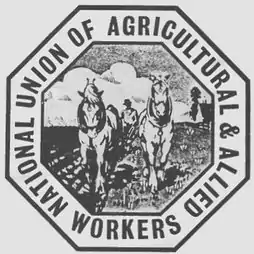National Union of Agricultural and Allied Workers
The National Union of Agricultural and Allied Workers (NUAW) was a trade union in the United Kingdom which existed between 1906 and 1982. It represented farmworkers.
National Union of Agricultural and Allied Workers | |
 | |
| Merged into | Transport and General Workers' Union (Agricultural Section) |
|---|---|
| Founded | 20 July 1906 |
| Dissolved | 1982 |
| Headquarters | 308 Gray's Inn Road, London |
| Location | |
Members | 70,800 (1946)[1] |
Key people | George Nicholls (President), George Edwards (Secretary), Richard Winfrey (Treasurer), William "Bill" Holmes (General Secretary). |
| Publication | The Landworker |
| Affiliations | TUC, Labour |
History
The union was established as the Eastern Counties Agricultural Labourers & Small Holders Union at a conference of Norfolk agricultural workers at the Angel Hotel, North Walsham on 20 July 1906. Its first president was George Nicholls, its secretary (on 13 shillings a week) was George Edwards and its treasurer was Richard Winfrey. The other members of its executive committee were J. Binder, J. Sage, William G. Codling, Herbert Day, J. Bly, C. Holman and J. Stibbins.[2]
The first three branches of the union were in Norfolk at St Faith's (former stronghold of Joseph Arch's old National Agricultural Labourers Union) and Kenninghall and Shipham.[2]
In 1910 major strikes and disputes broke out in the Norfolk villages of Trunch, Knapton and St Faith's. At St Faith's, the 105 union men were on strike from May 1910 until February 1911 for 1 shilling a week extra.[2]
The organisation changed its name in 1910 to the National Agricultural Labourers and Rural Workers Union.[2] Edwards stood down as Secretary in 1913, but then took up the post of President.[3] In 1920, the union became the National Union of Agricultural Workers, and in 1968 the "National Union of Agricultural and Allied Workers".[2][4]
The union not only fought for worker's rights but also provide social activities.[5]
The union's stronghold was in Norfolk, Lincolnshire and Dorset with over 90% of agricultural labourers being in membership.
William "Bill" Holmes, NUAW General Secretary once told an audience of American trade unionists: "In many of our villages, a man who joins a trade union is worthy of the Victoria Cross that's won on a battlefield. In many villages he dare not be known to be a member of the union. But to be a branch secretary! That is to risk one's livelihood every day in the week".
The union's journal was The Landworker.
The union became the Agricultural Section of the Transport and General Workers' Union in 1982. The Dorset County Committee organises the annual Tolpuddle Martyrs festival along with the TUC.
Election results
The union worked closely with the Labour Party from its early years.[6] Until 1945, it contributed election expenses to some candidates, but no ongoing expenses to those who won election, and therefore it is often not listed as a sponsor in this period.[7]
Leadership
General Secretaries
- 1906: George Edwards
- 1913: Robert Barrie Walker
- 1928: Bill Holmes
- 1944: Alf Dann
- 1953: Harold Collison
- 1969: Reg Bottini
- 1978: Jack Boddy
Presidents
- 1906: George Nicholls
- 1911: Walter Robert Smith[21]
- 1924: Bill Holmes
- 1928: Edwin Gooch
- 1966: Bert Hazell
- 1978: John Hose
See also
References
- Labour Party, Report of the Forty-Fifth Annual Conference of the Labour Party, p. 77
- Groves, Reg (2011). Sharpen the Sickle!:The History of the Farm Workers' Union. Merlin Press. ISBN 978-0-85036-695-2. Retrieved 14 November 2011.
- "Edwards, Sir George", Oxford Dictionary of National Biography
- Arthur Marsh and Victoria Ryan, Historical Directory of Trade Unions, vol.2, pp. 300–301
- The Museum of English Rural Life. "Berkshire darts tournament prize officiated by National Union for Agricultural Workers". www.reading.ac.uk. Retrieved 13 August 2021.
- Griffiths, Clare (2007). Labour and the Countryside. Oxford: Oxford University Press. ISBN 9780199287437.
- Parker, James (2017). Trade unions and the political culture of the Labour Party, 1931–1940 (PDF). Exeter: University of Exeter. p. 179.
- Howkins, Alun (1985). Poor Labouring Men. Routledge. ISBN 1315447827.
- Labour Party, Report of the Twenty-first Annual Conference of the Labour Party, p. 41
- Labour Party, Report of the Twenty-second Annual Conference of the Labour Party, pp. 255–272. Note that this list is of the sanctioned candidates as of June 1922, and there were some changes between this date and the general election.
- Labour Party, Report of the Forty-Fifth Annual Conference of the Labour Party, pp. 232–248
- "List of Parliamentary Labour candidates and election results, February 23rd, 1950". Report of the Forty-Ninth Annual Conference of the Labour Party: 179–198. 1950.
- "List of Parliamentary Labour candidates and election results, 25th October, 1951". Report of the Fiftieth Annual Conference of the Labour Party: 184–203. 1951.
- Labour Party, Report of the Fifty-Fourth Annual Conference of the Labour Party, pp. 255–275
- Labour Party, Report of the Fifty-Eighth Annual Conference of the Labour Party, pp. 179–201
- Labour Party, Report of the Sixty-Third Annual Conference of the Labour Party, pp. 158–180
- Labour Party, Report of the Sixty-Fifth Annual Conference of the Labour Party, pp. 308–330
- Labour Party, Report of the Sixty-Ninth Annual Conference of the Labour Party, pp. 289–312
- Labour Party, Report of the Seventy-Third Annual Conference of the Labour Party, pp. 391–411
- Labour Party, Report of the Seventy-Eighth Annual Conference of the Labour Party, pp. 406–431
- "DEATH OF MR. W. R. SMITH". Northampton Mercury. 27 February 1942. Retrieved 17 November 2015 – via British Newspaper Archive.
External links
- Catalogue of the NUAW archives held at the Modern Records Centre, University of Warwick
- Country Standard
- Account of the founding of the union From EASF website